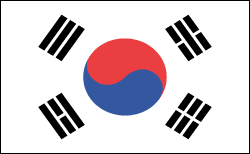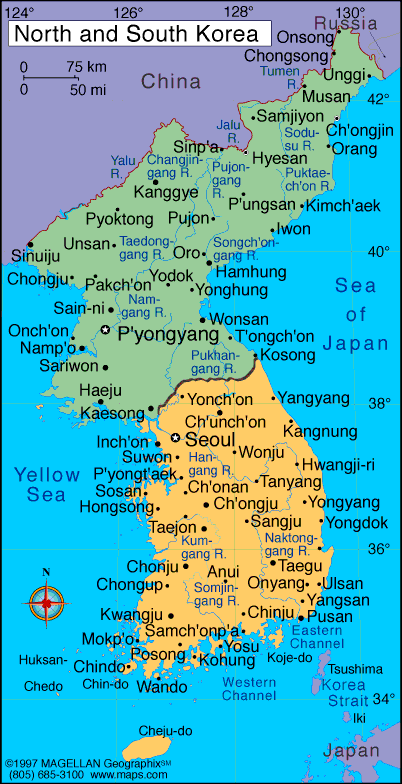KOREA, SOUTH

Geography: Slightly larger than Indiana, South Korea lies below the 38th parallel on the Korean peninsula. It is mountainous in the east; in the west and south are many harbors on the mainland and offshore islands.
Government: Republic.
History: South Korea came into being after World War II, the result of a 1945 agreement reached by the Allies at the Potsdam Conference, making the 38th parallel the boundary between a northern zone of the Korean peninsula to be occupied by the USSR and southern zone to be controlled by U.S. forces. (For details, see Korea, North. )
Elections were held in the U.S. zone in 1948 for a national assembly, which adopted a republican constitution and elected Syngman Rhee as the nation's president. The new republic was proclaimed on Aug. 15 and was recognized as the legal government of Korea by the UN on Dec. 12, 1948.
Government: Republic.
History: South Korea came into being after World War II, the result of a 1945 agreement reached by the Allies at the Potsdam Conference, making the 38th parallel the boundary between a northern zone of the Korean peninsula to be occupied by the USSR and southern zone to be controlled by U.S. forces. (For details, see Korea, North. )
Elections were held in the U.S. zone in 1948 for a national assembly, which adopted a republican constitution and elected Syngman Rhee as the nation's president. The new republic was proclaimed on Aug. 15 and was recognized as the legal government of Korea by the UN on Dec. 12, 1948.

Map of Korea,
South
President: Park Geun-hye (2013)
Prime Minister:
Hwang Kyo-ahn (2015)
Land area: 37,421 sq mi (96,920 sq
km)
Population (2014 est.): 49,039,986
(growth rate: 0.16%); birth rate: 8.26/1000; infant mortality rate:
3.93/1000; life expectancy: 79.8
Capital and largest city (2011 est.):
Seoul, 9.736 million
Other large cities:
Busan (Pusan) 3.372 million; Incheon (Inch'on) 2.622 million; Daegu
(Taegu) 2.447 million; Daejon (Taejon) 1.538 million; Gwangju (Kwangju)
1.503 million (2011).
Monetary unit: won
National
name: Taehan Min'guk
Languages:
Korean, English widely taught
Ethnicity/race:
homogeneous (except for about 20,000
Chinese)
Religions:
Christian 31.6% (Protestant 24%, Roman Catholic 7.6%), Buddhist 24.2%, other or unknown 0.9%, none 43.3% (2010 survey)
National Holiday:
Liberation Day, August 15
Literacy rate: 98% (2003 est.)
Economic summary: GDP/PPP (2013 est.):
$1.666 trillion; per capita $33,200. Real growth rate: 2.8%.
Inflation: 1.1%. Unemployment: 3.2%. Arable land:
14.93%. Agriculture: rice, root crops, barley, vegetables,
fruit; cattle, pigs, chickens, milk, eggs; fish. Labor force:
25.86 million; agriculture 6.9%, industry 23.6%, services 69.4%.
Industries: electronics, telecommunications, automobile
production, chemicals, shipbuilding, steel. Natural resources:
coal, tungsten, graphite, molybdenum, lead, hydropower potential.
Exports: $557.3 billion (2013 est.): semiconductors,
wireless telecommunications equipment, motor vehicles, computers,
steel, ships, petrochemicals. Imports: $516.6 billion
(2013 est.): machinery, electronics and electronic equipment, oil,
steel, transport equipment, organic chemicals, plastics. Major
trading partners: China, U.S., Japan, Australia, Saudi Arabia, Singapore, Hong Kong, Qatar
(2012).
Communications: Telephones:
main lines in use: 30.1 million (2012); mobile cellular: 53.625
million (2012). Broadcast media: multiple
national TV networks with 2 of the 3 largest networks publicly operated;
the largest privately-owned network, Seoul Broadcasting Service (SBS),
has ties with other commercial TV networks; cable and satellite TV
subscription services available; publicly-operated radio broadcast
networks and many privately-owned radio broadcasting networks, each with
multiple affiliates, and independent local stations (2010).
Internet Service Providers (ISPs): 315,697 (2012). Internet
users: 39.4 million (2009).
Transportation: Railways: total: 3,381 km
(2008). Highways: total: 104,983 km; paved: 83,199 km
(including 3,779 km of expressways); unpaved: 21,784 km (2009 est).
Waterways: 1,600 km; use restricted to small native craft.
Ports and harbors: Incheon, Pohang, Busan, Ulsan, Yeosu. Airports: 111
(2013).
International disputes:
Military Demarcation Line within the 4-km-wide Demilitarized
Zone has separated North from South Korea since 1953; periodic incidents
with North Korea in the Yellow Sea over the Northern Limit Line, which
South Korea claims as a maritime boundary; South Korea and Japan claim
Liancourt Rocks (Tok-do/Take-shima), occupied by South Korea since 1954.
-------------------- o --------------------
No comments:
Post a Comment